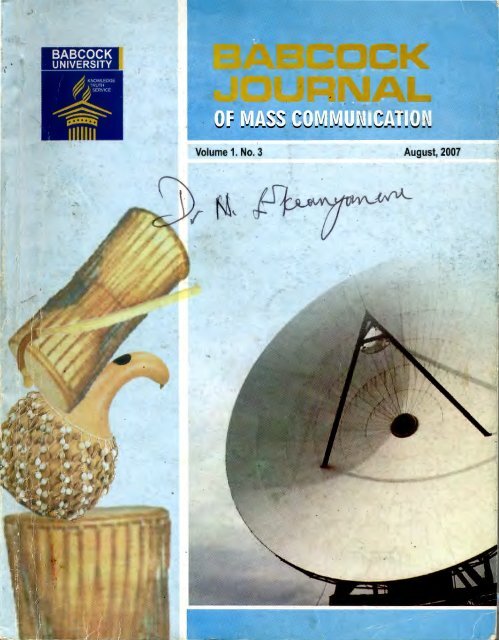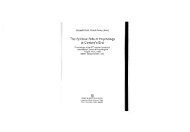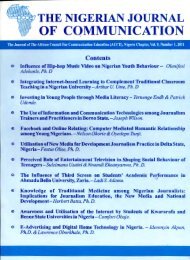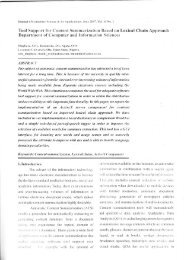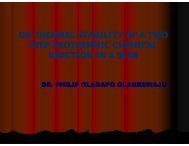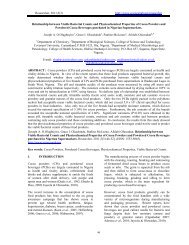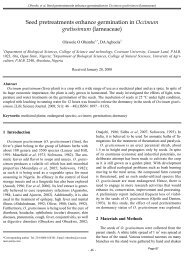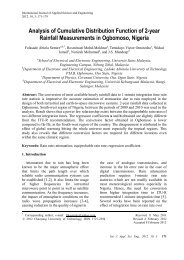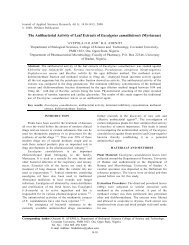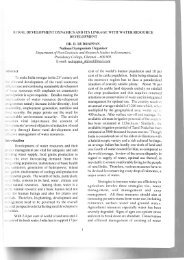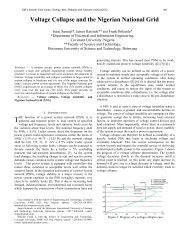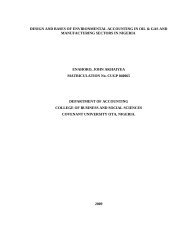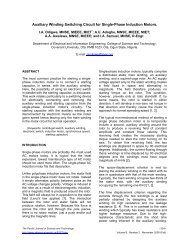Download (4Mb) - Covenant University Repository
Download (4Mb) - Covenant University Repository
Download (4Mb) - Covenant University Repository
Create successful ePaper yourself
Turn your PDF publications into a flip-book with our unique Google optimized e-Paper software.
BABCOCK<br />
UNIVERSITY<br />
. -,<br />
Volume 1. No. 3 . August, 2007
Babcock Journal of Mass Communication Vol. I. No 3. August, 2007<br />
A COMPARATIVE ANALYSIS OF NIGERIAN NEWSPAPERS COVERAGE<br />
AND MANAGEMENT OF POLITICAL CONFLICTS IN A PLURALISTIC<br />
SOCIETY<br />
* Ekeanyanwu Nnamdi Tobechukwu<br />
ABSTRACT<br />
This paper considers Nigeria as a pluralistic society and evaluates newspapers' coverage<br />
and management of political crises and conflicts during the Obasanjo (Second Term)<br />
administration. The paper assesses the role of the Nigerian newspapers in the struggle for<br />
political positions, which breeds crisis and conflicts especially in a pluralistic society. It is<br />
the position of the paper that the Nigerian newspapers have not fared very well in this type of<br />
reporting because of the advocacy position adopted by most of them. It is also observed that<br />
editorial influence on the part of publishers may not be unconnected with this trend. Using<br />
content analysis as the main instrument of facts generation, this paper submits that the<br />
Nigerian newspapers have operated more as active players in political crisis and conflicts<br />
than as an impartial judge of such crisis, conflicts, events, analysis and controversies. This<br />
has impaired greatly the management of such crisis and conflicts. This paper therefore,<br />
cautions against advocacy journalism in the Nigerian media industry and suggests more<br />
public participation in the media industry through ownership and better professional and<br />
ethical practices.<br />
INTRODUCTION<br />
Communication is so vital in our lives that no nation has been known to exist without it. It<br />
is the exchange of ideas, views, information, experiences and the sharing of meanings<br />
between persons, nations, societies and cultures. This necessitates the continuous study in the<br />
area of communication and how it affects different societies and people.<br />
The understanding of the place of communication becomes more inlperative in the 21st<br />
century for obvious reasons. The 21 st Century is the age of Information and Communication<br />
Technologies (ICTs) powered by the developments in computer technology. The age of ICfs<br />
has taken science and technology to another level. Nations, societies, peoples and even<br />
businesses are now run with the help of technology; those that are not technology complaint<br />
lose their touch, influence and essence.<br />
One sure way of keeping in touch with our contemporary world is through the media. The<br />
media (press or newspapers ih this paper) any where in the world are generally referred to as<br />
the "Fourth Estate of The Realm" and the "watchdog of the society", meaning that the media<br />
exist as an organ of information sourcing and dissemination,<br />
educational promotion, entertainment, surveillance and social enlightenment and<br />
mobilization. These functions set the media apart as an important arm of government-<br />
* Ekeanyanwu is a Lecturer in the Department of Mass Communication, <strong>Covenant</strong> <strong>University</strong>, Ota;<br />
Ogun State, Nigeria<br />
85
Babcock Journal of Mass Communication Vol. 1. No 3. August, 2007<br />
governed relationship.<br />
Furthermore, democratic culture has also given the press the privilege of setting the<br />
agenda of political discourse and other forms of socio-cultural cum economic discussions.<br />
This invariably makes the press very powerful and influential. How is the Nigerian press<br />
using this power in the management of crises and conflicts? What roles have they played and<br />
what positions and sides have they taken in conflict management and resolution? These<br />
posers and more will preoccupy the attention of this paper in this discourse.<br />
The development of the Nigerian democracy [which is our study focus] and politics is<br />
closely linked with that of the press. This is so because the nationalists used the press as an<br />
instrument of struggle during the pre-independence and military era. Since then, the Nigerian<br />
press has continued to participate in the political setting of the country.<br />
However, Nigeria as a developing nation needs a press more attuned to developmental<br />
reporting than with conflicts and crises. Nwuneli (1986) notes that too much crises<br />
journalism can have a disturbing effect on the rationality and the quietness that is needed in a<br />
developing polity. This view also receives the support of Mahatma Gandhi cited in Galadima<br />
and Enighe (2001 :62-3) thus: "The press is a great power but as an unchained torrent<br />
submerges the whole countryside and devastates crops, even so an uncontrolled pen serves<br />
but to destroy."<br />
This makes this paper relevant at this point in Nigeria's march to true democratization and<br />
development. Our democratic march has not been without problems and challenges and the<br />
press has had its own fair share. Taking some lingering political crises in Nigeria as the point<br />
of focus, the paper aims at ascertaining the role and involvement of the Nigerian press in<br />
political conflict reporting. The primary purpose here is to identify where the press has done<br />
it wrongly, praise their genuine efforts, suggest a better way forward and help the sustenance<br />
of our democratic values and culture inspite of these challenges.<br />
Some of the issues analyzed are "Godfatherism" or political patronage, election rigging<br />
and judicial handling of election petitions, the numerous impeachment threats and actual<br />
impeachment of State Governors, their Deputies, Speakers of State Assemblies and Local<br />
Government Chairmen; and, of course, the judicial interpretation and handling of the<br />
conflicts arising from all these.<br />
Godfatherism, for instance, is a lingering factor in the Nigerian political scene and what is<br />
·happening in Nigeria today, is also happening in most other third world nations in different<br />
forms and realm [A pilot study suggests this]. It is a common conflict amongst the political<br />
class. It could be regarded as politics of sponsorship to political positions, control of political<br />
power, political patronage and the ultimate control of state treasury, personnel and resources.<br />
The Nigerian newspapers during the period under analysis are awash with streaming<br />
headlines and reports about how the Obasanjo administration used the Economic and<br />
Financial Crimes Commission (EFCC) to pursue and eliminate the opposition and their<br />
sworn enemies. We saw how only four members in a twenty member State House Assembly<br />
sat and purportedly impeached a Governor from office. In Ekiti State, we also saw the<br />
emergence of two incumbent Governors before the declaration of a state of emergency. The<br />
Constitutional amendment debates, the "Third Term" agenda and political succession<br />
86
Babcock Journal of Mass Communication Vol. I. No 3. August, 2007<br />
relations, usually with a view to achieving specific, quite often selfish objectives and<br />
interests. Conflict can also be seen from another angle as a situation in which an individual,<br />
group or organization is compelled-by circumstances to make a choice between two opposing<br />
courses of action, which are both unfavourable to the one compelled to make the decision or<br />
choice. When the situation described above is about political issues or politics in general<br />
terms, it is then regarded as political conflict. _<br />
The Greek philosopher, Aristotle, described man as "a political animal". This includes<br />
reporters too who have political emotions that taint their political reports. This could be very<br />
dangerous in a third world nation and in a nation of multi-ethnic, religious, cultural, linguistic<br />
and so on, like Nigeria. Therefore, political conflict reporting should not be left in the hands<br />
of the cub reporter or the inexperienced, unchallenged, and neophyte reporter. This is<br />
important for obvious reasons. Politics strives at building a stable nation, not a nation of<br />
instability. Therefore, the political reporter is supposed to play an ombudsman (middle man<br />
or mediator) role between the major players in the political field and conflict.<br />
He is also expected to play the role of a "go-between" between the political class and the<br />
entire society in his political coverage and reporting. He is never expected to be biased and<br />
subjective, although he could be objectively opinionated; he should play down on advocacy<br />
journalism and only strives to give the society the facts the way it is and allow them to take<br />
their individual positions. In political conflict reporting, the reporter should never be a player<br />
or combatant no matter the level of provocation or involvement of his personal values. In<br />
fact, the political reporter in reporting conflicts, especially in a pluralistic society like<br />
Nigeria, must remain aloof so that the players can see him as being in the centre and<br />
consequently listen and heed to his call. This is conflict management in the media.<br />
THEORETICAL FRAMEWORK AND LITERATURE REVIEW<br />
Many theories exist to address media influence through coverage. Some of these theories<br />
are offshoots of the minimal effects and the all-powerful effects theories of the press.<br />
However, for this study, we shall hinge our discussion on two related theoretical constructs.<br />
These constructs are the Gatekeeping and the Agenda - Setting theories of the press. The<br />
rationale for selecting these theories is obvious. The two theories are without the usual<br />
controversies and debates that hamper effective application of media theories to address<br />
relevant issues. For instance, the effect of the agenda setting function of the media is without<br />
doubt. So also is the acceptance of the media role of gatekeeping. Therefore, the theories that<br />
arose from these accepted media functions have continued to remain relevant in addressing<br />
media coverage of national and international issues.<br />
The Gatekeeping theory is a child of the gatekeeping function of the mass media of<br />
communication. Kurt Lewin formed the term "gatekeeping" at about 1951. He used the term<br />
to describe those. individuals who control the "gates" or channels through which information<br />
or news passes from the source to the final consumers. Lewin's point here is that no media<br />
house, no matter the size and level of operation, can transmit all the messages it receives in<br />
the course of a day's business. Some persons have to decide which news to transmit, which<br />
to defer its transmission to another date and time, which to modify, which to delete<br />
88
Babcock Journal of Mass Communication Vol. 1. No 3. August, 2007<br />
completely or which to kill outrightly. Such persons, according to Lewin (1951), open and<br />
close the gate that stands between the news sources and the receivers. Note, gatekeeping as a<br />
mass media activity and fu nction does not stop at opening and closing the news gate, or<br />
rejecting and accepting news/information for publication or broadcast, it also involves the<br />
shaping and reshaping, display, timing, repetition etc of the news and information in the<br />
various media establishment. According to Professor Okwudiba Nnoli, cited in Attah<br />
(2006:42), "the media provide a consistent picture of the social world which may lead the<br />
audience to adopt the media version of social reality of fact and norm, value and<br />
expectations".<br />
The journalist is first and foremost a gatekeeper and may have to perform this role at<br />
different periods in the news process. According to Folarin (2002), the factors influencing<br />
gatekeeping decisions include timing, ownership pattern, management policy, perceived<br />
needs and preferences of the audience, editor's perception of reality, views held by editor's<br />
colleagues, influence of advertisers, appraisal of offering by the competition, availability of<br />
photography or film footage, legal consideration, professional ethics and ideological<br />
perspectives and political orientation. The media decide what millions will learn of, and<br />
indeed how they will interpret the day's events in the nation and in the world. They create<br />
national issues and icons overnight, and can make or mar by their coverage and the slant they<br />
give to issues. The Gatekeeping Theory, therefore, revolves around the media role of news<br />
selection and dissemination in line with the influential factors listed above.<br />
The second theoretical construct, which will also help us to analyze the. performance of<br />
the Nigerian mass media industry in reporting and managing crises and conflicts, is the<br />
Agenda-Setting Theory of mass communication. According to McComb and Shaw (1974),<br />
the media emphasis on an issue influences the audience to also view the issue as important.<br />
The media attach certain weights to news stories through placement, size and frequency of<br />
appearance of such stories. Agenda-Setting posits that audiences learn these salient issues<br />
from the news media, thus incorporating a similar set of weights and importance into their<br />
own personal agenda.<br />
Shaw (1983: 132) reaffirms this view when he posits that the media, by focusing repeated<br />
and major attention on an event or set of related events, can transfer that event into an issue.<br />
Umechukwu (2001:148-150) and Folarin (2002:75-76) also agree that the mass media have<br />
an impact on agenda setting in that they have the ability to choose or emphasize certain<br />
topics thereby causing the public to perceive the issues or topics as important. This implies<br />
that the mass media pre-determine what issues are considered as important at a given time in<br />
a given society. Agenda-Setting Theory, however, does not give to the media the ultimate<br />
power to determine what the public actually thinks; but it does give them the power to<br />
determine what the public should be thinking about. The above view is a reaffirmation of<br />
Bernard Cohen (1963) statement that the media may not be successful in telling people what<br />
to think but they may be very successful in telling them what to think about<br />
Sandman et al (1976:19) also sees agenda setting as the editorial decision that a particular<br />
event is not news if the news media ignores it or says so. Globally, any event given major<br />
emphasis in the mass media ultimately becomes a major event. The journalist, therefore,<br />
89
Babcock Journal of Mass Communication Vol. I. No 3. August, 2007<br />
effect cognitive change among individuals and at times thinks for them. This is exactly what<br />
is referred to as agenda setting, which gave birth to the Agenda-Setting Theory of the press.<br />
The literature on the role of the mass media in political reporting (nationally, locally and<br />
internationally) abounds in published materials. No doubt, media scholars are in agreement<br />
about the role the media could play in political reporting which is a primary area of<br />
development in any polity. Politics without so much emphasis determines the well-being of a<br />
society. Even development communication has a political undertone or coloration. We shall,<br />
therefore, attempt a summary of literature review here.<br />
Shaw and McCombs (1977:106) did a comprehensive work on agenda setting and are in<br />
acknowledgement of the fact that public surveillance of the media revolves around setting<br />
agenda for civic concern and action. This is politically significant. Generally, it is held that<br />
newsmen determine what is news, which political happening or condition will be covered or<br />
prescribed and which to downplay or give prominence in their daily coverage of national and<br />
international issues. Undesirable political conditions that may be tolerated while they remain<br />
obscure may quickly become intolerable in the glare of publicity (Umechukwu, 2001: 103).<br />
McCombs and Mauro (1977) on their on part note that the media also provide clues to the<br />
public about the degree of importance of an issue. Political issues covered more prominently<br />
by the media are likely to be considered most important by media audience.<br />
Blurnler (1978:22) cited in Umechukwu (2001:104) points out that the mass media, while<br />
surveying the environment, functions essentially as agencies of social legitimation - as<br />
forces, which reaffirm those ultimate value standards and beliefs, which in turn, upholds the<br />
social and political status quo. Since the media are the eyes and ears of the citizens, their<br />
means of surveillance which tell them about political conditions, economic and social<br />
conditions, journalists need to be more objective in news reporting and imbibe a crusading<br />
posture in order to influence public opinion. It is through the gathering and dissemination of<br />
information that the people are assumed that their political system is still relevant despite the<br />
predisposition to trial and error mechanism. This is very vital if the people must have peace<br />
of mind. They need this kind of reassurance in any political system (Ekeanyanwu, 2005).<br />
This is probably the reason while Edelman (1964:38) posits that reassurance tends to keep<br />
the populace politically and economical quiescent because there is no need to act if political<br />
leaders seem to be doing their job very well.<br />
The Nigerian mass media could also perform the function of promoting political<br />
socialization. Gerbner et al (1982: 101) in this line, view the mass media as "the mainstream<br />
of the common symbolic environment that cultivates the most widely shared conceptions of<br />
reality". Kraus and Davies (1976), and Chaffee et al (1970) empirically support this. These<br />
mass communication scholars and media researchers all agree that the mass media are the<br />
primary agents of political socialization. To corroborate this view, U mechukwu (200 1: 106)<br />
notes thus:<br />
This being the case, the Nigerian mass media should present political values<br />
that will lead to reforms since media-cultivated facts and values are standard by<br />
which we can judge. Once basic orientations towards the political system have<br />
been formed, attitudes usually stabilize and later learning largely supplements<br />
90
Babcock Journal of Mass Communication Vol. 1. No 3. August, 2007<br />
and refines earlier notions. Much of what the average person learns about<br />
political norms, rules, values, and events ... necessarily come from the mass<br />
media. People's opinion, feelings, and evaluation about political system may<br />
spring from the their own processing of facts supplied by the media. It is,<br />
therefore, imperative that journalists should task themselves with supplying the<br />
right political values, which would create response from the people.<br />
Still on political socialization, which the mass media is expected to promote, Okunna<br />
(1998:108) notes that through the process of socialization, the individual is made aware of<br />
and internalizes the values, norms and acceptable behaviour pattern of the society. They<br />
provide a common body of knowledge, the internationalization of which enables people to<br />
operate as effective members of their society.<br />
It is also important at this point to briefly summarize some findings on the Nigerian press<br />
coverage of conflicts and crises. Galadima and Enighe (2001) analyzed the Nigerian press<br />
coverage of political issues and came up with the following valid conclusions:<br />
1. The Nigerian press are always used by their owners- private party<br />
or government - for the propagation of the interests of such<br />
owners, especially in the struggle to gain power or monopolize<br />
same<br />
2. There is recklessness and partisanship on the part of the press<br />
during elections and transition to the civil rule programmes<br />
instead of restraint and responsible reporting of events.<br />
3. The principle of objectivity is always abandoned by the<br />
championing of the causes of their masters political struggles<br />
4. Manipulations of the press to report false election results, which<br />
caused violence, mostly in the western region, have been a<br />
common trend since independence.<br />
5. Proscriptions, banning and closures of media houses with the aim<br />
of reducing (or avoiding) courses, as ·a result of the points<br />
mentioned earlier is another recurrent trend since the first<br />
republic<br />
This trend also manifested in the now sacred June 12 crises of 1992. The authors cited<br />
above note that when the Babangida political programme became an unending one; the<br />
Nigerian press abandoned their partisanship against and among the different political<br />
leanings and unanimously faced that military regime. This led to what Alade Odunewu<br />
(1994) of the Nigerian Press Council called "Suicide Squad Journalism" in Nigeria. This<br />
term was used to refer to the relentless and continued mounting of pressure on the military<br />
over the lack of sincerity of purpose in the management of both the economic and political<br />
91
Babcock Journal of Mass Communication Vol. I. No 3. August, 2007<br />
TABLE 3: Story Classification<br />
Frequency Percent<br />
Valid Cumulative<br />
Percent Percent<br />
Valid News 20 36. 54. 54.<br />
Features 1 1. 2. 56.<br />
Interpretative Articles 3 5. 8. 64.<br />
Editorials 2 3. 5. 70.<br />
Other 11 20. 29. 100.<br />
Total 37 67. 100.<br />
Missing System 18 32.<br />
Total 55 100.<br />
-------·- ------- -<br />
TABLE 4: Slant/Direction<br />
Cumulative<br />
Frequency Percent Valid Percent Percent<br />
Valid Favourable 210 38.1 56.8 56.8<br />
Unfavourable 60 10.9 16.2 73.0<br />
Neutral 100 18.1 27.0 100.0<br />
Total 370 67.2 100.0<br />
Missing System 181 32.8<br />
Total 551 100.0<br />
TABLE 5: Sources of the Reports<br />
Cumulative<br />
Frequency Percent Valid Percent Percent<br />
Valid In-house Staff 231 41 .9 62.4 62.4<br />
News Agency Reports 19 3.4 5.1 67.6<br />
Unidentified Source 120 21 .8 32.4 100.0<br />
Total 370 67.2 100.0<br />
Missing System 181 32.8<br />
Total 551 100.0<br />
96<br />
-
Babcock Journal of Mass Communication Vol. 1. No 3. August, 2007<br />
TABLE 6: Method Used in Gathering Information<br />
Frequency Percent Valid Percent<br />
Cumulative<br />
Percent<br />
Valid Personal Interviews 48 8.7 13.0 13.0<br />
Investigative Journalism 32 5.8 8.6 21 .6<br />
Interviews and<br />
Investigative Journalism<br />
115 20.9 31 .1 52.7<br />
Unspecified in the<br />
Report<br />
175 31 .8 47.3 100.0<br />
Total 370 67.2 100.0<br />
Missing System 181 32.8<br />
Total 551 100.0<br />
TABLE 7: Frequency of Coverage of Political Conflicts and Non-Political Conflicts<br />
Reports<br />
Type Of Report Frequency Percent Valid Cumulative<br />
Percent Percent<br />
Political Conflict Reports 370 67.2 67.2 67.2<br />
Non-Political Conflict 181 32.8 32.8 100.0<br />
Reports<br />
TOTAL 551 106.0 100.0<br />
TABLE 8: Ethnic Nationality of Publisher<br />
Cumulative<br />
Frequency Percent Valid Percent Percent<br />
Valid South-South 110 20.0 29.7 29.7<br />
East 61 11 .1 16.5 46.2<br />
West 84 15.2 22.7 68.9<br />
North 115 20.9 31 .1 100.0<br />
Total 370 67.2 100.0<br />
Missing System 181 32.8<br />
Total 551 100.0<br />
97
TABLE 11<br />
Babcock Journal of Mass Communication Vol. 1. No 3. August, 2007<br />
Newspaper • Method Used in Gathering Information Crosstabulation<br />
Method Used in Gathering Information<br />
Interviews<br />
and Unspecified<br />
Persona Investigative Investigative in<br />
the Reports<br />
Interview Journalism Journalism<br />
Total<br />
Newspaper Guardian Count 48 32 30 0 110<br />
Expected Co nt 14.3 9.5 34.2 52.0 110.0<br />
The Champion Count 0 0 0 61 61<br />
Expected Co nt 7.9 5.3 19.0 28.9 61 .0<br />
Tribune Count 0 0 0 84 84<br />
Expected Co nt 10.9 7.3 26.1 39.7 84.0<br />
Daily Trust Count 0 0 85 30 115<br />
Expected Co nt . 14.9 9.9 35.7 54.4 115.C<br />
Total Count 48 32 115 175 370<br />
Expected CoL nt 48.0 32.0 115.( 175.( 370.C<br />
Table lla:<br />
.,<br />
Chi-Square Tests<br />
Value df<br />
Pearson Chi-Square 450.669"<br />
Likelihood Ratio 514.937<br />
Linear-by-Linear<br />
Association<br />
104.993<br />
N of Valid Cases 370<br />
a. 0 cells (.0%) have expected count less than 5. The<br />
minimum expected count is 5.28.<br />
100<br />
Asymp. Sig.<br />
(2-sided)<br />
9 .000<br />
9 .000<br />
1 .000<br />
I
Table 13:<br />
Babcock Journal of Mass Communication Vol. 1. No 3. August, 2007<br />
Ethnic Nationality of Publisher* Prominence Cross Tabulation<br />
Prominence Total<br />
Front Back Inside Front<br />
Page Page Page Page<br />
Ethnic South- Count 16 15 79 110<br />
Nationality of<br />
Publisher<br />
South<br />
Expected<br />
Count<br />
23.5 16.1 70.5 110.0<br />
East Count 29 11 21 61<br />
Expected 13.0 8.9 39.1 61.0<br />
West<br />
Count<br />
Count 12<br />
1"-<br />
5 67 84<br />
Expected<br />
Count<br />
17.9 12.3 53.8 84.0<br />
North Count ' 22 23 70 115<br />
Expected<br />
Count<br />
24.6 16.8 73.7 115.0<br />
Total Count 79 54 237 370<br />
Expected<br />
Count<br />
79.0 54.0 237.0 370.0<br />
Table 13a:<br />
Chi-Square Tests<br />
Value df Asymp. Sig. (2sided)<br />
Pearson Chi-Square 44.189(a) 6 .000<br />
Likelihood Ratio<br />
.<br />
42.058 6 .000<br />
Linear-by-Linear Association .002 1 .963<br />
N of Valid Cases 370<br />
a. 0 cells (.0%) have expected count less than 5. The minimum expected count is<br />
8.90.<br />
103
Babcock Journal of Mass Communication Vol. 1. No 3. August, 2007<br />
potential to tum the media into a sectional media with its attendant difficulties in managing<br />
conflicts of national magnitude.<br />
Therefore, the following recommendations are made to move the press forward in their<br />
reporting of crises and conflicts. Firstly, as I pointed out in this paper, the Nigerian press<br />
should avoid advocacy journalism (journalism of taking stands on controversial issues and<br />
goes about vehemently to advocate the acceptance of such stands notwithstanding the<br />
feelings of the audience who have not been properly sensitized on all the sides of such an<br />
issue), or practice it with caution if and when it cannot be avoided.<br />
Again, more private participation in the ownership of the Nigerian media system should<br />
be encouraged. More media houses, more access, more analysis of issues, better coverage,<br />
more reportage and more presentation of all sides of a controversy, conflict or crise&. Apart<br />
from private ownership, the public should also get involved through joint ownerships,<br />
corporate ownership, and group ownership to avoid the excesses of the private media moguls<br />
who may be hell bent on pursuing partisan interests through their media houses<br />
(Ekeanyanwu, 2005:234).<br />
Mike Egbon, a renowned professor of communication, compiled a more comprehensive<br />
guideline to help media organizations in their reportage of crises and conflicts thus:<br />
1. Collective national interest must supersede parochial ethnic and individual interests.<br />
2. Press freedom should be limited where national survival is threatened or where it<br />
conflicts with constitutional provisions and rights.<br />
3. Sensationalism that could possibly blow up crises should be seriously avoided.<br />
4. Suppression of the truth should be avoided as it will obviously escalate the crises and<br />
create a false sense of security.<br />
5. Professionalism and ethical considerations must be held in high esteem or sacrosanct<br />
in the management and coverage of crises.<br />
6. Maintain a healthy skepticism and provide socially responsible criticism, avoiding<br />
relentless hostility.<br />
In conclusion, the Nigerian press must rise above petty reporting and face the challenges<br />
of constructive and balanced reporting especially during crises/conflict periods. The press,<br />
however, should not support evil or help to perpetuate it and should therefore always take a<br />
stand against it. This must be done professionally, ethically, objectively, and cautiously. The<br />
public interest must be the guiding and overriding interest in such situations (Ekeanyanwu,<br />
2005:234).<br />
Finally, Conflict and Diversity Reporting should be taught in institutions of higher<br />
learning where mass communication, journalism, broadcasting or media studies are taught.<br />
This will help the journalist to become more professional in his handling of conflict-based<br />
reports.<br />
REFERENCES<br />
Attah, V.C. (2006). Nigerian Media and the Challenges of the 21 51 Century. Akwa Ibom:<br />
Government Press.<br />
108


